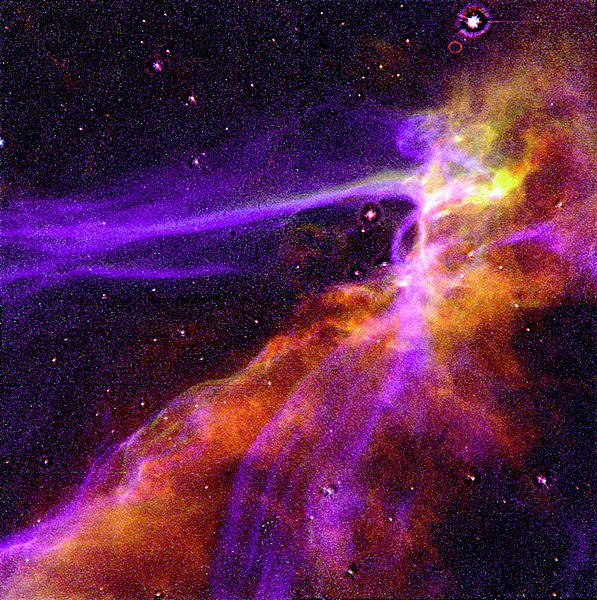Image of a small portion of the Cygnus Loop supernova remnant, which marks the edge of a bubble-like, expanding blast wave from a colossal stellar explosion, occurring about 15,000 years ago. NASA photo by J. J. Hester: 1 January 1993 [public domain / Wikimedia Commons]
These exchanges occurred in the combox of my post, Theist & Atheist Burdens of Proof. The various atheists’ words will be color-coded.
* * * * *
Well_Read: depends on what the rules of evidence are. if you have no rules of evidence or they are very broad, then the sky being blue may be enough for you to believe. If your rules are more narrow you may need to see something that god has done that cannot be explained any other way. Most of our gaps in knowledge about how we got here have more plausible explanations in science, but then I don’t need for there to be a god to be happy or feel safe.
Okay, please tell me how you think the universe got here without God. I’m curious how that reasoning proceeds. We think God is the reasonable explanation. But if one doesn’t allow a God or even non-material spirits from the outset, obviously the option is ruled out. If we don’t “know” then we should be open (and humble) enough to admit that we don’t know that there could not have been a God Who brought about the universe, rather than rule Him out.
[she put up a little video entitled, “Evolution from Bacteria to Humans.”]
This doesn’t deal with the question of how bacteria came to be, and life from non-life, and the universe as a whole from nothing or who knows what . . . .
just because we haven’t discovered everything is no reason to say god did it. we are smarter than that now aren’t we?
amino acids have been found in comets here, it’s the building block of all life. time will tell.
the big bang has been proven to people who don’t need the bible for a science book. planets and stars are still being formed right in front of us, we can watch it happen in real time.
the people who wrote the bible didn’t know what bacteria was, thought the earth was flat, and didn’t know where the sun went at night.
it doesn’t affect me at all if you get your science from them.
1. An open-minded thinker will not rule out the possibility of a God Who is the Designer of the Universe. Many atheists are not “hard atheists.” They say they have not seen convincing evidence that God exists, but would be open to such, and to His possible existence.
Therefore, it is not so extraordinary that some of us have been convinced that God exists. It’s not merely “god of the gaps” or the explanation for everything that we can’t personally figure out. I hate to take away one of the favorite atheist polemics, but it is a dumb and stupid one and should be put out to pasture.
2. No intelligent Christian will say the Bible is a “science book.” But you can always find backwoods fundamentalists (which many atheists once were) to say so, and pretend like this is mainstream Christianity.
3. The Big Bang Theory was initiated in 1927 by a Catholic priest-scientist, Fr. Georges Lemaître, while most atheists (indeed, most astronomers and physicists, period) had believed in the steady state / eternal universe (which was decisively refuted in 1965 by the discovery of the cosmic microwave background radiation). The Bible had stated 3,000 years ago, that the universe began out of nothing.
4. The Bible does not teach a flat-earth cosmology; nor have virtually any thinking Christians believed in that, these past 2,000 years (as I have documented in several papers about the history of scientific opinions among Christian thinkers). If you weren’t so ignorant of what the Bible teaches, you would already know that.
5. You also don’t know one blasted thing about where I “get” my science. I get it from scientists, just as you do, not from the Bible.
[stated to someone else in the thread but amply applies to this person]:
The fact that many scientists today disallow any talk of non-materialism whatever is no proof that materialism is Unalterable Dogma. I understand that scientism is likely your religion: as is the case with many atheists. So y’all are particularly sensitive to any critique of the sheep-like behavior and erroneous opinions of materialistic scientists. Not much I can do about that. Religious folk often have a thin skin and don’t take kindly to any criticism of their dogmas.
Shane Egan: The ‘answer’ because ‘god did it’ has no real explanatory power. It equates to ‘magic’. How is that a sufficient answer to ANY question?
Theism is not “magic”: it’s a detailed philosophy / religion, which has been developed all through human history.
It has no explanatory power if you disallow it from the outset, due to your arbitrary restrictions of category.
Nor does “matter has all these extraordinary capabilities allowing it to create everything in the universe” have any real explanatory power, since it is never explained how these processes work at their origins or how these remarkable powers came to be. It requires even more faith to believe in these things without a Higher Intelligence, than to believe in God.
Now it’s fashionable to resort to multiverses because of lack of answers about origins, but of course that solves nothing; explains nothing. It simply pushes the questions of origin further back in time, or before time, or whatever. They still have to be accounted for. So that hasn’t been explained at all on atheist / materialist assumptions, whereas the theist offers a serious, solid philosophical argument: the cosmological argument (which incorporates empirical elements within itself), that gives a cogent, plausible explanation of origins: as good as any other.
Octavo: I think the burden of proof is probably going to depend on the common beliefs of the people arguing. Scenario 1 If Person A believes in the physical world (as understood by modern science), and Person B believes in the physical world (as understood by modern science) + the spiritual world (as described by a particular religion), then Person B is going to have the burden of proving why Person A should add the beliefs they don’t commonly share with Person B. [went on to describe two other scenarios that described religious persons who think a lot differently than I do]
That’s good; this is something constructive to work with. Thanks!
Of course, I go with scenario 1, and say that at the point of origins and irreducible complexity, science has no cogent answers (if any at all). A thinker is then justified in positing (within philosophical paradigms) a Higher Intelligence or Being to explain origin. Even David Hume did that (in a deistic sense). Albert Einstein did, too, but in a much vaguer pantheistic way.
Cosmological and teleological arguments . . .
Scientists routinely make lots of unproven (and non-demonstrable or non-demonstrated) assumptions about how things came to be.













